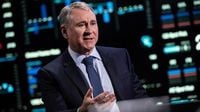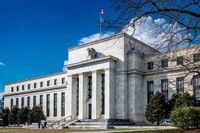Hedge fund billionaire Ken Griffin, CEO of Citadel and one of the world’s wealthiest investors, has issued a stark warning about President Donald Trump’s increasingly vocal interventions in Federal Reserve policy. In a series of high-profile statements and a co-authored op-ed published in The Wall Street Journal on September 7, 2025, Griffin, alongside Chicago Booth Business School professor Anil Kashyap, cautioned that Trump’s public criticisms and attempts to pressure the central bank could have dire and lasting consequences for the U.S. economy.
Griffin’s message comes at a moment when most business leaders have chosen to keep their heads down, avoiding direct confrontation with Trump’s administration. Yet, as CNN reported, Griffin—who notably voted for Trump in the 2024 presidential election—has broken ranks, warning that the president’s strategy of publicly criticizing the Fed, suggesting the dismissal of its governors, and pushing for a more permissive stance on inflation “carries steep costs.”
“The president’s strategy of publicly criticizing the Fed, suggesting the dismissal of governors and pressuring the central bank to adopt a more permissive stance towards inflation carries steep costs,” Griffin and Kashyap wrote in their op-ed. They referenced the Nixon-era pressure on the Fed in the 1970s, a move widely blamed for setting the stage for the so-called Great Stagflation crisis—an era marked by runaway inflation and economic stagnation. “History shows the dangers,” Griffin explained, pointing out that similar tactics in the past led to a prolonged surge in prices and eroded public trust in economic institutions.
According to Benzinga, Griffin did not mince words about the broader risks. He argued that politicizing the Federal Reserve and removing its independence could backfire in two major ways: first, by overheating the economy and worsening inflation, and second, by undermining investor and consumer confidence in the Fed’s commitment to stable prices. “Once credibility is compromised, it’s hard to restore stability while keeping inflation expectations and borrowing costs in check,” Griffin warned.
The op-ed also highlighted the potential political fallout. “In a worst-case scenario, if the Fed visibly bows to political pressure and permits inflation to rise unchecked, tens of millions of retired Americans will see their savings diminished,” Griffin and Kashyap cautioned. “Senior voters — tired of bearing the brunt of inflation — could cost the administration dearly in the midterms.” The message is clear: tampering with the Fed’s independence is not just risky economics, but risky politics as well.
Official statistics, as reported by CNN, suggest that inflation remains a persistent concern. Forecasters expect the consumer price index for August 2025 to show a 2.9% year-over-year increase, up from 2.7% in July and 2.5% at the same point last year. Despite these numbers, White House spokesperson Kush Desai insisted that “the Trump administration’s policies have swiftly tamed Joe Biden’s inflation crisis,” and called for the Fed to cut rates to “deliver needed interest rate relief to American families while supporting economic and employment growth.”
But Griffin’s warnings extend beyond inflation data. In their Wall Street Journal piece, he and Kashyap emphasized that the U.S. has built its economic credibility slowly, over decades, and that this credibility is not inexhaustible. “The U.S. built its economic credibility slowly over a long time. Once lost, it won’t be easy to regain,” Griffin wrote. They argued that if the Fed’s independence is eroded, financial markets could demand much higher interest rates for long-term debt, driving up borrowing costs for the federal government, businesses, and homebuyers alike.
Griffin’s critique is not limited to Trump’s handling of the Fed. According to Benzinga, he also highlighted the risks of the president’s interventions into the Bureau of Labor Statistics, including the dismissal of its head. “Mr. Trump’s interventions and his dismissal of the head of the Bureau of Labor Statistics have damaged the credibility of official economic data,” Griffin said. He warned that undermining trust in these institutions could further destabilize the economy and erode public confidence.
The billionaire’s willingness to speak out is particularly notable in the context of Corporate America’s usual reticence. While big bank CEOs have publicly defended the Fed’s independence, most have avoided direct criticism of Trump. Griffin, however, has repeatedly criticized the administration’s trade war and tariff policies as well. Earlier in 2025, he called Trump’s approach to tariffs “terrifying,” arguing that it opened the door to crony capitalism and resulted in the government picking “winners and losers.”
Griffin’s op-ed also drew parallels with other countries where political interference in central banking has led to negative outcomes. He cited the United Kingdom as an example, noting that political meddling there has led to a loss of credibility and higher borrowing costs. The lesson, Griffin insists, is that “it is in the president’s best interest for the Fed to be seen as independent — and to act independently. The independence gives the central bank space to make difficult choices required to curb inflation.”
Supporting Griffin’s concerns, Nobel laureate Paul Krugman recently echoed similar warnings. As HuffPost reported, Krugman argued that Trump’s belief in the benefits of lower short-term interest rates ignores the risk that such moves could actually increase long-term rates by raising inflation expectations. “Trump may imagine that lower short-term interest rates will lift him in the polls, while ignoring the high likelihood that such a steep fall in short-term interest rates will raise expected inflation and, as a result, long-term rates will go up, not down,” Krugman said. He even likened Trump’s approach to treating interest rate reductions as a “trophy,” rather than a nuanced economic tool.
Amidst all this, Treasury Secretary Scott Bessent has entered the fray, arguing that the Fed should be relieved of its duties regulating America’s banks because it has strayed from its core mission. This suggestion, reported by CNN, adds another layer of uncertainty to the central bank’s future role and independence.
For Griffin and Kashyap, the bottom line is that “credibility in economic policymaking is built slowly, through practice and respect for processes, and can be lost quickly if those processes are disregarded.” Their hope, it seems, is that both the administration and the public heed these warnings before the country’s hard-won economic stability is put at risk.
As the debate over the Fed’s independence intensifies, Griffin’s rare and forceful intervention serves as a reminder that the credibility of America’s economic institutions is not a given—it must be protected, even when political pressures run high.


